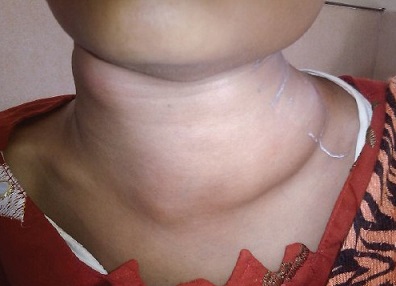COVID-19 New: Incidences Of Individuals Developing Kikuchi After mRNA Vaccines Rising!
Nikhil Prasad Fact checked by:Thailand Medical News Team Jan 28, 2024 2 years, 4 days, 16 hours, 21 minutes ago
COVID-19 News: There has been rising number of incidences being observed in various hospitals and clinics of individuals who had been vaccinated with the mRNA COVID-19 vaccines developing histiocytic necrotizing lymphadenitis or cervical lymphadenopathy, both commonly known as Kikuchi-Fujimoto disease (KFD).
 Kikuchi Disease After mRNA Vaccines
Kikuchi Disease After mRNA Vaccines
Once considered a very rare disease and predominant mostly among women, the debut of the COVID-19 mRNA vaccines has seen the number of cases of Kikuchi-Fujimoto disease (KFD) both in females and even males being reported escalating at worrisome rate.
There have been numerous case reports published in various medical journals and even
COVID-19 News reports validating the development of Kikuchi-Fujimoto disease (KFD) after COVID-19 mRNA vaccine injections. For some it can days immediately after the vaccines while many it can even be weeks or months later!
https://www.achr.co.in/journal-article-file/20728
https://www.sciencedirect.com/science/article/pii/S2214250921002092
https://journals.sagepub.com/doi/10.1177/10668969231212428
https://link.springer.com/article/10.1007/s12308-021-00477-1
https://www.cureus.com/articles/140271-kikuchi-fujimoto-lymphadenitis-a-rare-association-with-covid-19-vaccination#!/
https://www.cureus.com/articles/84059-kikuchi-fujimotos-disease-or-histiocytic-necrotizing-lymphadenitis-following-mrna-covid-19-vaccination-a-rare-case#!/
https://casereports.bmj.com/content/15/11/e250601
https://academic.oup.com/ajcp/article-abstract/160/2/114/7126979
https://www.mdpi.com/2076-393X/9/11/1251
https://brieflands.com/articles/healthscope-133434
https://www.tandfonline.com/doi/full/10.1080/21645515.2022.2071080
&a
mp;nbsp;
https://www.tandfonline.com/doi/pdf/10.1080/03009742.2023.2241760’
https://www.eurannallergyimm.com/cont/journals-articles/1272/volume-kikuchifujimoto-disease-covid-vaccination-pharmacovigilance.asp
https://haematologica.org/article/view/haematol.2021.280239
https://amjcaserep.com/abstract/full/idArt/933377
https://bjgp.org/content/bjgp/73/728/109.full.pdf
https://www.mdpi.com/2076-393X/11/3/696
https://www.sciencedirect.com/science/article/pii/S0266435621001625
https://www.elsevier.es/es-revista-revista-espanola-patologia-297-avance-resumen-kikuchifujimoto-disease-type-lymph-node-S1699885523000065
https://www.cureus.com/articles/57996-a-case-of-cervical-lymphadenopathy-after-vaccination-against-covid-19#!/
https://www.eurekaselect.com/article/132587
https://www.thailandmedical.news/news/breaking-covid-19-news-sars-cov-2-infections-and-covid-19-vaccines-can-also-cause-kikuchi-disease
(There are many more case reports online, these are just a few.)
What is worrying is that many of these cases of as Kikuchi-Fujimoto disease after the vaccines are not resolving fast even with treatments!
The most common clinical manifestation of Kikuchi disease is unilateral cervical lymphadenopathy, with or without systemic signs and symptoms such as fever and skin rash.
Cervical lymphadenopathy refers to the swelling of lymph nodes located in the neck. Lymph nodes, situated all over the body, are part of the lymphatic system, which works to protect the body against microbes, maintain adequate fluid levels, absorb nutrients, and remove certain waste products. Lymphocytes, or white blood cells, are activated in the lymph nodes, after which they travel into the bloodstream to defend the body against microbes. When the lymph nodes accumulate excessive amounts of lymphocytes, they can increase in size and become swollen.
Cervical lymphadenopathy can often be confused with cervical lymphadenitis. Although cervical lymphadenitis does usually present with cervical lymphadenopathy, cervical lymphadenitis refers to a direct infection of the cervical lymph nodes, often resulting from bacterial or viral infection.
Clinically and histologically, the disease can be mistaken for lymphoma or systemic lupus erythematosus (SLE); it may also precede, coexist with, or follow SLE.
Kikuchi-Fujimoto disease is similar to a type of inflammatory response called granulomatous response. When the lymph nodes are examined under a microscope, specific changes may be seen such as tissue necrosis (cell death) and an absence of a particular type of immune cell called neutrophils. Instead, the necrotic areas mainly contain remnants of cells undergoing apoptosis, where the cell nucleus breaks down. In simpler terms, KFD is a unique condition where the affected tissue shows signs of cell death, but the immune cells generally associated with that kind of reaction are missing. This unusual pattern makes it distinct from other diseases with similar symptoms.
Rarely, enlargement of the liver and spleen and nervous system involvement resembling meningitis are seen. Often a bout of extreme fatigue can occur - often taking hold during latter parts of the day and the affected person can be more prone to fatigue from exercise.
Kikuchi disease almost typically runs a benign course and resolves in several weeks to months. Disease recurrence is unusual, and fatalities are rare, although they have been reported.
Treatment of Kikuchi disease is generally supportive. Pharmacologic therapy that has been recommended includes the following:
-Nonsteroidal anti-inflammatory drugs (NSAIDs) - To alleviate lymph node tenderness and fever
-Corticosteroids - For severe extranodal or generalized Kikuchi disease
Hydroxychloroquine - For steroid-resistant or recurrent cases
-Intravenous immunoglobulin - For steroid-resistant or recurrent cases
Doctors are warning that with such incidences of Kikuchi-Fujimoto disease (KFD) occurring as a result of the vaccines rising, urgent research is warranted as to what are the possible mechanism involved and to also determine the long term health risk and effects of the vaccines and also the emergence of the disease.
Clinicians should be aware of the association of the disease and the mRNA vaccines so that better and faster diagnosis can be conducted with individuals with lymphadenopathy.
For the latest
COVID-19 News, keep on logging to Thailand Medical News.
Read Also:
https://www.thailandmedical.news/news/breaking-covid-19-news-doctors-in-thailand-warn-that-covid-19-vaccines-could-possibly-lead-to-tumor-expansion-in-certain-cancers
https://www.thailandmedical.news/news/breaking-covid-19-news-thailand-doctors-finally-speak-up-against-covid-19-vaccines-and-long-covid-investigations-should-be-initiated
https://www.thailandmedical.news/news/breaking-covid-19-news-germany-s-top-professors-in-chemistry-calls-for-investigations-into-unwanted-proteins-in-covid-19-mrna-vaccines
